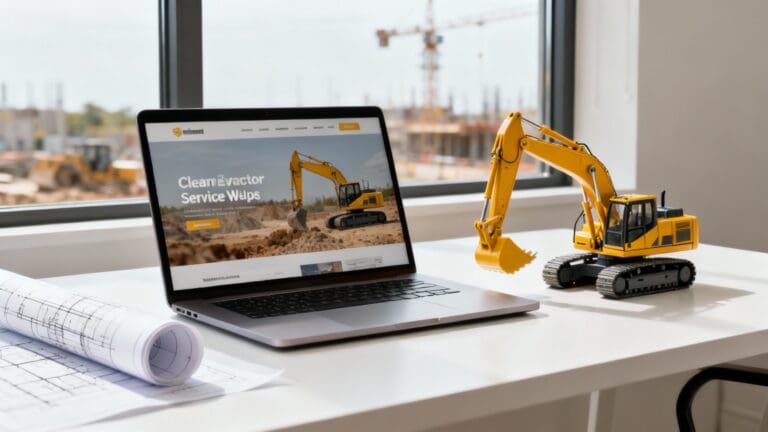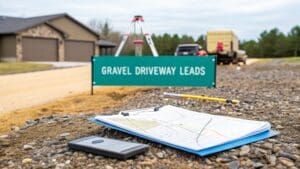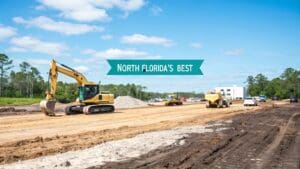Let's be honest. Is your website out there digging up new jobs for you, 24/7? Or is it just sitting there, collecting digital dust? Lots of contractors think of their website like a boring old tool—you have to have it, but it's not very exciting.
But what if you thought of it as your best employee?
Imagine a salesperson who works all day and night, never asks for a day off, and always shows customers your best work. That’s what a great website does for your excavation business. This isn't about fancy, confusing computer stuff. It's about a simple idea: your website is your front door online, and it’s the first thing people see. Let's make it awesome.
You can do this. It's way easier than you think, and we can help you every step of the way.
Turn Your Website Into Your Best Salesperson
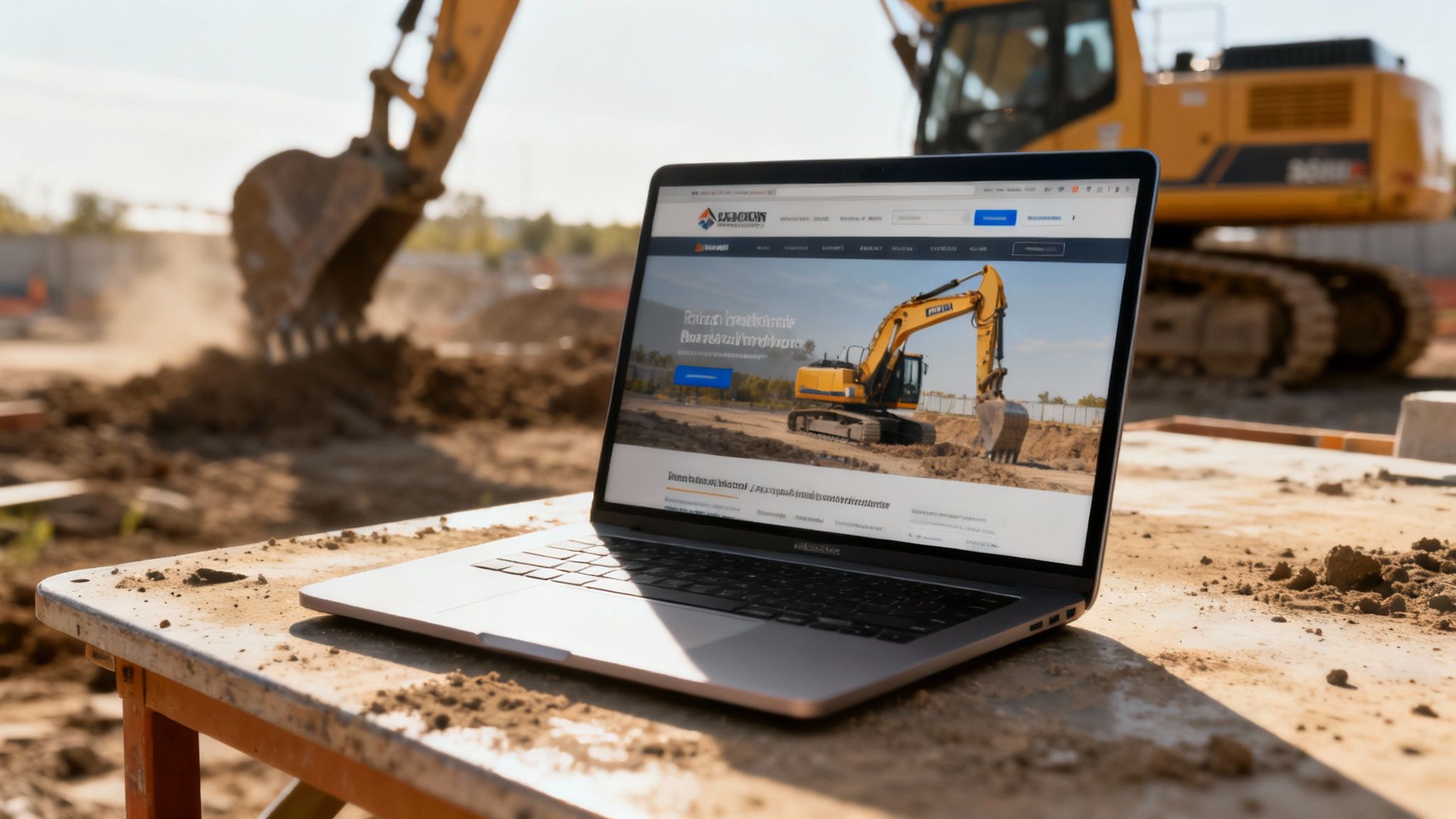
Why Your Online Front Door Matters
A clean, professional site does more than just look pretty. It's how you get found online, make people trust you right away, and get your phone to ring.
When a builder or a homeowner needs some digging done, where do they look first? Yep, Google. If your website pops up and is easy to use, you're already halfway to getting the job.
Think about it like this:
- It Answers Questions Fast: A good site tells people what you do, where you work, and how to get a quote in just a few seconds. No hunting around.
- It Shows Off Your Awesome Work: A picture gallery of a finished project is like a gold medal. It proves you know what you’re doing.
- It Makes You Look Like a Pro: A sharp, modern website tells people you're a serious business they can trust with their big project. No one wants to hire a slob, right?
This isn't just a small thing. The excavator business is getting bigger, expected to grow from USD 85 billion in 2025 to almost USD 129.7 billion by 2035. As more work becomes available, a great website is what will make you stand out from the other guys.
The Simple Stuff You MUST Have
You don't need a million flashy gizmos to get more jobs. In fact, simple is way better. A great excavator website just needs a few key things to turn visitors into customers.
Here’s a quick list of the must-haves. It’s super simple!
| Website Feature | Why You Totally Need It |
|---|---|
| Big "Get a Quote" Buttons | Makes it super easy for people to ask for a price. Don't make them think! |
| Awesome Project Photos | Shows you do great work. A picture of a perfectly dug foundation is better than 1,000 words. |
| List of Your Services | Tells people exactly what you do (like clearing land or digging for pools). |
| Your Service Area | Shows where you work so you don't get calls from three states away. What a time-saver! |
| Works on a Phone | Most customers are looking you up on their phones while standing on a job site. It has to work! |
| Your Phone Number (Everywhere!) | This is the #1 goal. Make it big, make it clickable, and put it all over the place. |
Getting these basics right is what makes a website actually bring in new business.
The goal is to lead visitors from "Who is this?" to "I need to call these guys right now!" For a deeper look at this, a modern sales funnel B2B guide can help. Just make it super easy for them to pick you.
You can have a website that does this for you. You don't need to be a computer genius. It’s all about giving your customers what they need, plain and simple. We’ve seen how a great website can change a business, and you can see how we think about lead generation website design for home services contractors. Let’s get you a site that works as hard as you do.
Build an Online Showroom Customers Will Love
When someone lands on your site, what’s the first thing they see? Is it a clean, impressive showcase of your work? Or is it a confusing mess that makes them want to run away?
Your website is your online showroom. Its only job is to make people trust you the second they arrive. This isn't about being fancy; it's about being clear. You can create a powerful online space that proves you're the right person for the job, and it’s way easier than you think.
Let's do it!
Start with a Powerful Services Page
Before anyone hires you, they need to know one thing: can you fix their problem? A great "Services" page answers that question right away. Don't just list "excavation." Be specific, but use simple words.
Think about what your customers are really looking for. They aren't typing in machine model numbers; they're typing in the problem they have. Your services page needs to speak their language.
Here’s how you can talk about what you do:
- Foundation Digging: We dig perfect holes for new homes and buildings.
- Land Clearing: Got a messy lot? We'll clear trees, bushes, and rocks to get it ready for building.
- Septic System Installation: We handle everything to get your new septic system in the ground.
- Utility Trenching: Need to run lines for water or power? We dig clean, safe ditches right where you need them.
See how simple that is? You’re not just listing a chore. You’re explaining how you help people. This makes customers feel confident that you’re a problem-solver, not just some guy with a machine.
Key Takeaway: Your website should answer a visitor's main question—"Can you do what I need?"—in less than five seconds. A clear and simple Services page does just that.
Create a Project Gallery That Sells for You
Words are nice, but pictures are proof. A "Project Gallery" or "Our Work" page is your best sales tool. It’s where you show people how good you are, not just tell them.
You don't need to be a pro photographer! Your phone is all you need to take great pictures that build major trust. The trick is to show the whole story.
For every project, try to include a few key photos.
Simple Phone Photo Tips:
- The "Before" Shot: Take a quick picture of the messy, untouched site before you start. This sets the scene.
- The "During" Shot: Snap a photo of your excavator hard at work. This shows you're getting it done.
- The "After" Shot: This is the money shot! Capture the finished project—the clean lot, the perfect foundation, the graded land. It's so satisfying!
Next to the photos, write a simple sentence explaining the job. Something like: "We cleared this messy lot in Newark for a new home. The customer was so happy to finally start building!"
This simple formula—before, during, after, and a quick story—turns your gallery into a bunch of success stories. It lets new customers imagine you doing the same great work for them. A clean website design makes these photos really stand out. You can learn more about how to capture the eye of customers with a simple, clean website design in our other guide.
By creating just these two simple pages, you’re building an online showroom that works for you 24/7. You're proving you're an expert and showing off real results. It’s that easy.
Showcase Your Fleet From Minis to Monsters
Your excavators are the heroes of your business. They do all the heavy lifting (literally!). So let's make sure your website treats them like the rock stars they are.
This isn't about bragging. It's about showing a customer you have the perfect tool for their job. Whether you have a little mini for tight backyards or a giant monster for huge construction sites, your website needs to show it off.
Speak Your Customer's Language
It’s easy to get lost in technical details. You know what a "2.5-ton operating weight" means, but your customer has no clue. They just want to know if you can dig their new pool without squashing their prize-winning roses.
You have to turn the tech talk into simple benefits. Forget the boring spec sheet and explain what the machine does for them.
Here’s how easy that is:
-
Instead of: "2.5-Ton Mini Excavator"
-
Try: "Our Mini Excavator: Perfect for backyard projects and fitting through skinny gates."
-
Instead of: "45-Ton Operating Weight"
-
Try: "The Big Guy: Our heavy-duty excavator for clearing big lots and commercial jobs."
See the difference? You're not just listing equipment; you're showing customers you have the solution to their problem. This helps them find what they need right away.
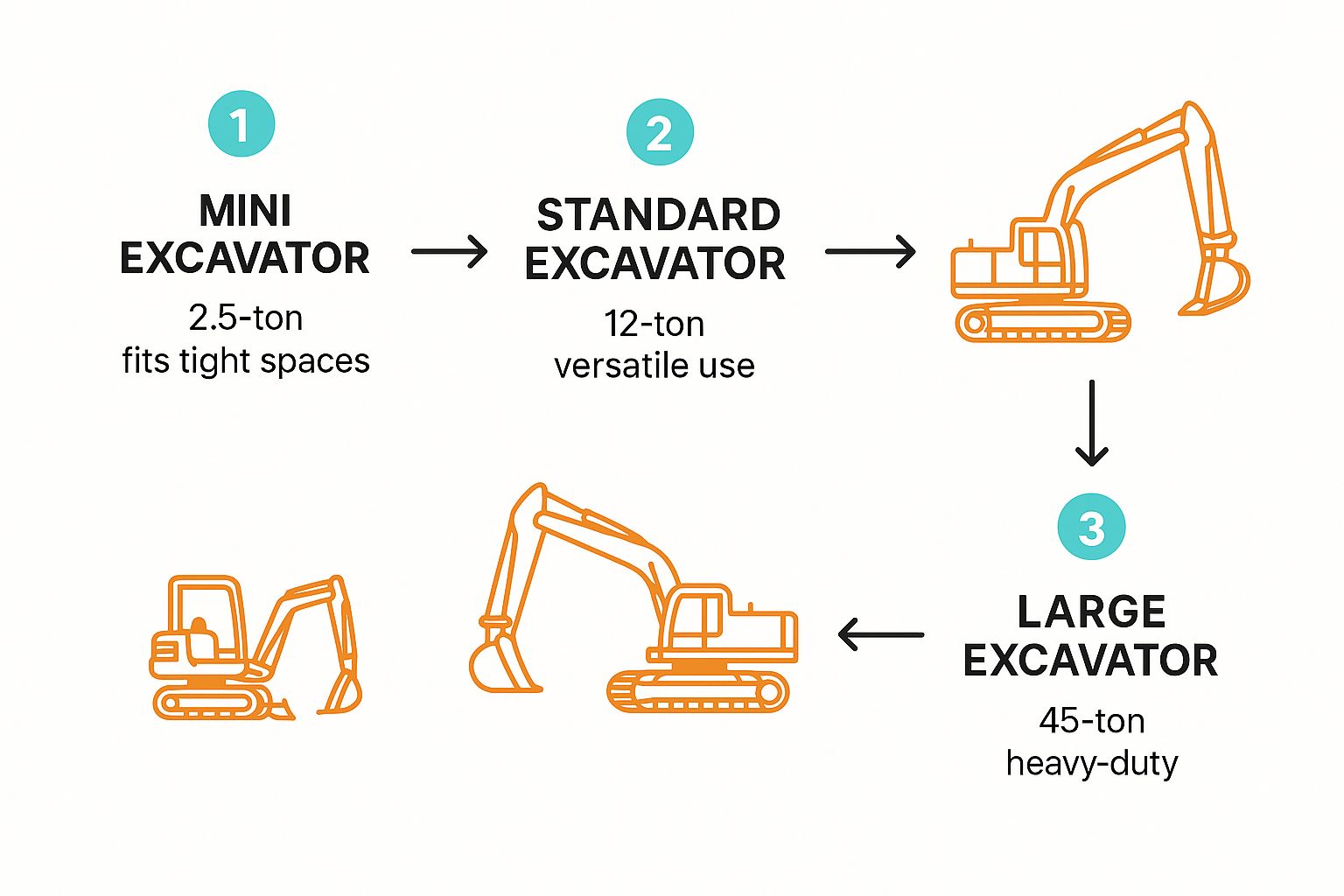
Showing your fleet this way helps a customer see you've got them covered, no matter the size of their project.
Make Your Machines Shine with Photos and Videos
Photos and short videos are your secret weapons. A page full of boring text is a snooze-fest. But a great picture of your excavator digging a foundation? That gets people excited. It shows your machine doing what it does best.
You don't need a Hollywood film crew. Just grab your phone and get a few shots. A 15-second video of your machine loading a truck or digging a trench can be more powerful than a whole page of words. It proves your equipment is ready to work.
Pro Tip: Wash your machine before you take photos! A clean excavator looks professional and tells customers you take care of your stuff. That means you'll probably take care of their job site, too.
Don't Forget the Small But Mighty
The market for smaller machines is huge. In fact, nearly 34,072 new mini excavators were sold in the U.S. recently, making up over 22% of all new financed equipment sales. You can learn more about how buyers are researching equipment online at Total Landscape Care.
That's a ton of people looking for help with smaller jobs. If you have a mini, make sure it's a star on your website because homeowners are looking for it!
A great website connects you with these customers. It’s all about showing off your machines in a simple way that answers their questions. Our guide on website design for contractors has even more easy tips.
You have the tools that solve people's problems. Your website's only job is to show them that. It's not complicated, and you can totally do it.
Get Found by Customers Ready to Hire You
Having a good-looking website is great, but if nobody ever sees it, it’s like having the world’s best business card hidden in a drawer. A great website isn’t just about looking cool; it's about getting found by the right people when they need you.
This is where the magic of "getting found" comes in. Don't let the fancy term Search Engine Optimization (SEO) scare you. It's just a simple way of telling Google what you do and where you do it. Then Google can show your website to local customers who are ready to hire someone right now.
You can absolutely do this, and it’s easier than you think.
Speak the Language of Local Search
When a homeowner needs a foundation dug in your town, what do they type into Google? I promise they aren’t searching for "geotechnical earthmoving solutions." They're typing something simple.
They're searching for things like:
- "Excavator services in Newark, Ohio"
- "Land clearing near me"
- "Foundation digging contractor in Licking County"
Your job is to make sure these exact phrases are on your website. Sprinkle them into your headlines and service descriptions. This is like putting up a giant sign on the internet that points right to your business. It tells Google, "Hey, over here! We're the ones they're looking for!"
Your Most Powerful (and Free) Marketing Tool
One of the best ways to show up in local searches is with a Google Business Profile. You’ve seen them—it's the map and business info that pops up on the side of a Google search. And the best part? It’s totally free.
Think of it as a mini-website that Google loves. It shows your phone number, hours, service area, and customer reviews all in one spot. When someone searches for "excavator company near me," a good profile can put you right at the top.
Getting this set up is a must-do for any local business. We have a simple guide that shows you exactly how to do it right here: how to optimize your Google Business Profile.
The Bottom Line: A beautiful website that no one can find is a waste of money. Simple, local SEO is how you turn your site into a machine that makes your phone ring.
Simple SEO Checklist for Your Excavator Site
You don't need to be a tech wizard to make your website "search engine friendly." It all comes down to a few simple steps. If you can do these, you’re already miles ahead of your competition.
- Make it Work on a Phone: Most people are searching on their phones. If your site looks weird on a phone, Google will push you down in the search results. Simple as that.
- Make it Fast: If your site takes forever to load, people will click away. Nobody has time for that! Aim for a site that loads in under 3 seconds.
- Use Your Town's Name: Mention your city and the towns you serve all over your site. This tells Google you're a true local expert.
- Answer Customer Questions: Think about common questions customers ask and answer them on your site. This is great for new technologies like Answer Engine Optimization (AEO) that help you get found through voice search.
Speaking of questions, it’s smart to get ahead of what people are asking. Since fuel can be 20-30% of your costs, some customers might be curious about efficiency. Mentioning any fuel-efficient or hybrid machines you have could attract smart clients.
Getting found online isn't a secret code. It’s about being helpful, being local, and making it easy for Google to understand what you do. We can help you get all these pieces in place, so customers find you first.
Make It Super Easy for Customers to Say Yes
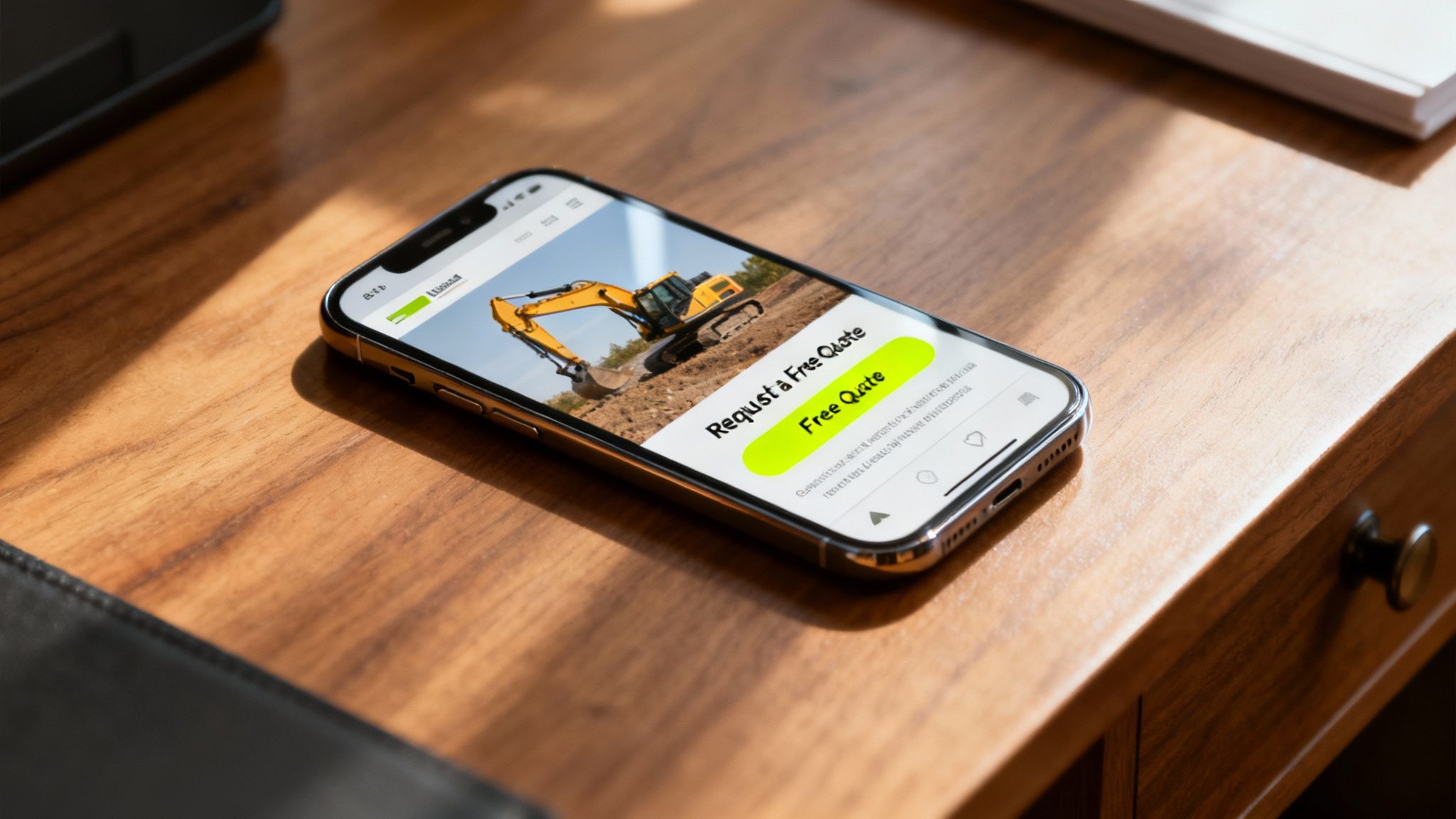
Okay, you did the hard work. Your site has awesome photos and shows off your cool machines. The customer is impressed. They’re thinking, "This is the company I want to hire!"
Now what?
This is the most important part. You have to make it ridiculously easy for them to call you. If a customer has to search for your phone number, you’ll lose them. They'll just go back to Google and find your competitor. Nobody's got time for that!
This final step is about getting their info so you can give them a quote and win the job. The goal is to bulldoze any problems standing between them and a phone call to you.
Plaster Your Phone Number Everywhere
I'm not kidding. Everywhere. Don't make people hunt for your number like it's buried treasure. Your phone number is the most important thing on your entire website. It needs to be impossible to miss.
Put it in these spots:
- At the very top of every page: Put it right in the header, big and bold.
- At the very bottom of every page: Add it to the footer.
- On your "Contact Us" page: This is an obvious one, but make it big.
- Next to your "Request a Quote" button: Give them two easy ways to reach you.
And here's a super important tip: on a mobile phone, your number must be "click-to-call." That means a visitor just taps the number on their screen and their phone instantly dials you. This one simple thing can get you way more calls. It’s a game-changer.
Keep Your Contact Form Stupid Simple
Some people like filling out a form instead of calling. That's cool, but don't scare them off with a form that's a mile long. A complicated form is the fastest way to make someone give up.
You only need the most important stuff. Anything else just gets in the way.
Your form should only ask for three things:
- Name: So you know who you’re talking to.
- Phone Number or Email: So you can get back to them.
- A simple message box: For them to describe their project (e.g., "Need a hole dug for my new garage").
That's it. Don't ask for their address or their life story. Just get the conversation started. A simple form feels easy and safe.
Key Insight: A website visitor is 80% more likely to fill out a short, simple contact form than a long, complicated one. Your goal is just to get their contact info so you can have a real conversation.
The Big, Bright "Get a Quote" Button
Every page on your website needs a clear goal: to get the customer to contact you. The best way to do that is with a big, bright, impossible-to-miss button that basically yells, "Click Me!"
This is your call to action (CTA), and it should be the most obvious thing on the page. Use a color that stands out, like a bright orange or green, and use simple words like "Get a Free Quote."
Contact Methods Graded From Good to Great
Not all ways of contacting you are the same. Some just work better. Here’s a simple breakdown.
| Contact Method | How Well It Works | A Simple Tip to Improve It |
|---|---|---|
| A "Contact Us" Link | Good. It's what people expect to see. | Turn that link into a button. Buttons get way more clicks than plain text. |
| A Simple Contact Form | Better. People can reach out 24/7, even at midnight. | Only ask for the basics: Name, Phone/Email, and a Message box. That's it! |
| A Big "Get a Free Quote" Button on Every Page | Great! This is the winner. It's always there, reminding people what to do next. | Use a bright color and fun text like "Start Your Project Today!" |
As you can see, a simple link is okay, but a big, obvious button is what gets you jobs.
Getting this right is what turns your website from a boring online flyer into a machine that brings you paying customers. It's all about making it super simple for people to say "yes" and call you.
Common Questions About Excavator Websites
Got questions? Great! That means you're serious about this. Most of our clients ask the same things, so let's get them answered.
How Much Does a Website Cost?
This is always the first question, and the honest answer is: it depends. It’s like buying a new excavator—you can get a good, reliable one, or you can get a fancy one with all the bells and whistles. A professional website is way more affordable than you probably think.
The real question isn't about cost, but about what you get back. A good website isn't an expense; it’s a tool that should be making you money by bringing in more jobs. We can always make a plan that fits your budget and helps your business grow.
Do I Really Need a Blog?
You don't need one, but it can be your secret weapon to rule your local area. A blog is the easiest way to show you’re the expert. You don't have to write a book, either.
Just post simple answers to questions your customers ask all the time. Think about topics like:
- 5 Things to Know Before Digging a Foundation
- How to Pick the Right Machine for Clearing Land
- Funny Mistakes People Make on Job Sites
This is the kind of stuff people search for on Google. It builds trust before they even call you. It’s less work than you think and can help a lot.
How Long Does It Take to Build a Website?
It’s faster than you think. We're not talking about a six-month project that drags on forever. A professional site with all the important stuff we’ve talked about can be up and running in just a few weeks.
The biggest thing is having your photos and list of services ready to go. Our process is quick because we know you need to get your "online salesperson" out there working for you right away. Part of that is making sure your site is safe, too. You can learn more about why you need SSL on your website in our guide—it’s a must-have.
Our Promise: We make getting a website easy and painless. You’re busy running a business; let us handle the computer stuff to get you online and getting leads fast.
Can I Update the Website Myself?
Yes! In fact, we want you to. We build our sites on platforms that are super simple to use. If you can write an email or post on Facebook, you can update your website.
We'll even show you how to add new project photos or change your list of services. You should always be in control. It's your business and your website. You should never be stuck waiting for a "web guy" to make a simple change.
Ready to get a website that works as hard as you do? At The Cherubini Company, we make it simple. We build websites that get found, build trust, and make your phone ring.

